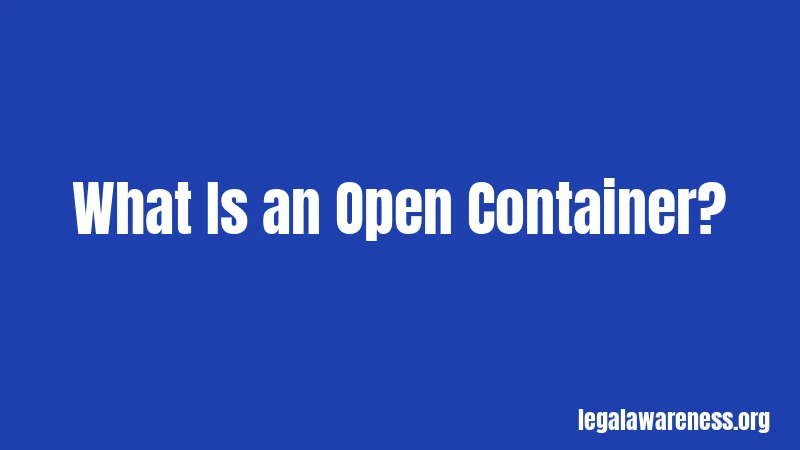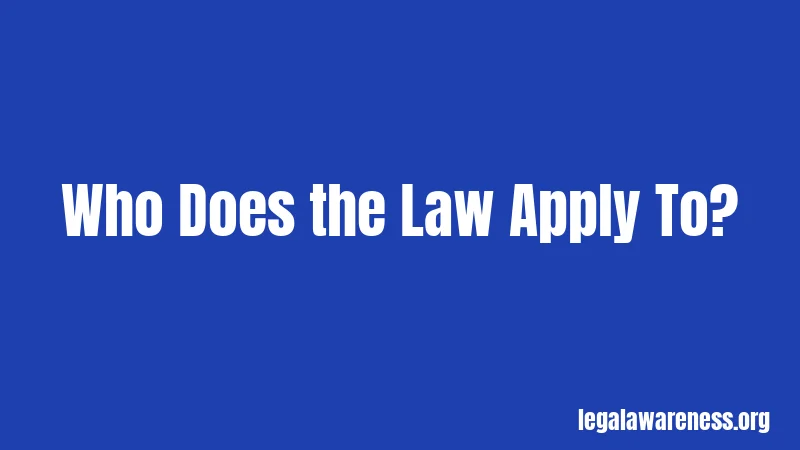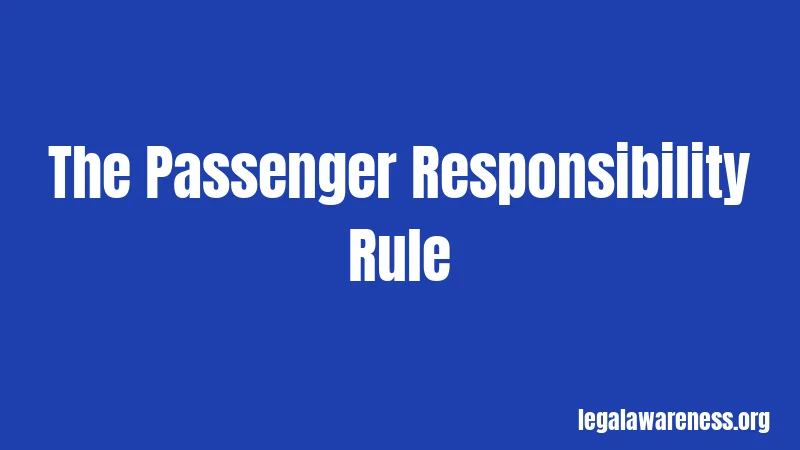Open Container Laws in Virginia (2026): What Drivers and Passengers Really Need to Know
You’re driving down the road. Your friend has an open beer in the cup holder. No big deal, right? Wrong. In Virginia, open container laws are serious business, and the penalties can hurt your wallet and your driving record. Stay with me here. This is one of those laws that catches way more people than expect it to.
Most people think open container laws only apply to the driver. Spoiler alert: they don’t. Virginia has strict rules about alcohol in vehicles, and they apply to passengers too. Let’s break down exactly what you need to know so you don’t end up on the wrong side of the law.
What Is an Open Container?

An open container is pretty much what it sounds like. It’s any bottle, can, or glass that contains alcohol and has been opened. If the seal is broken or the top is off, it’s open. This includes partially consumed drinks, finished drinks you’re still holding, or bottles someone’s been passing around.
Here’s the key part: it doesn’t matter if you’re drinking or not. Even a single open beer sitting in your car counts. The law doesn’t care if it’s a beer, wine, liquor, or anything else with alcohol. If it’s open and it’s in the vehicle, you could face trouble.
Wondering what counts as a vehicle? It’s basically anything with wheels that you drive on the road. This includes cars, trucks, vans, motorcycles, RVs, and even golf carts on public roads. The law covers all of them.
Virginia’s Open Container Law Explained
Virginia Code Section 4.1-228 is the statute that covers open containers. Honestly, this is the part most people miss. The law states that no one can have an open container of alcohol in a vehicle on a public road.
It doesn’t matter if you’re parked or driving. It doesn’t matter if the engine is off. If you’re anywhere in the vehicle and that container is open, you’re breaking the law. The vehicle has to be parked completely off the roadway to be legal.
Think of it like this: the law creates a “dry zone” around any vehicle on a public road. Once you open that alcohol, you’re stepping over the line. Pretty straightforward, right?
Who Does the Law Apply To?

Here’s where it gets important. Open container laws apply to everyone in the vehicle. That’s the driver. That’s the passenger in the front seat. That’s the people in the back. Everyone.
You might think the driver bears all the responsibility. Not quite. Virginia’s law specifically says anyone who possesses an open container in a vehicle can be cited. So if you’re a passenger holding a beer, you’re breaking the law just as much as the driver.
The only exception is alcohol in the trunk. If your open drinks are sealed in the trunk, you’re in the clear. Same goes for sealed containers in the back of a truck with no passenger compartment. Those don’t count.
Penalties for Open Container Violations
So what happens if you get caught? Let’s be real: it’s not good. In Virginia, an open container violation is a class 4 misdemeanor for a first offense. That sounds fancy, but here’s what it actually means for you.
First-time offenders face a fine of $25 to $250. That might not sound terrible until you add everything else. You’ll also get a criminal record. Your insurance could go up. Your driving record gets dinged. Some employers check driving records during hiring.
Okay, pause. Read this carefully. If you have a prior open container conviction within ten years, penalties jump way up. You’re looking at up to $500 in fines for a second offense. A third or subsequent offense can mean even more.
There’s no mandatory jail time for open container violations in Virginia, which is good news. However, a judge could potentially order up to one year in jail in rare cases. That’s extremely unlikely for a standard first offense, but it’s technically possible.
The Passenger Responsibility Rule

Not sure what counts as passenger responsibility? Let me break it down. Virginia treats passengers and drivers differently in some ways, but exactly the same when it comes to open containers.
A passenger cannot claim they didn’t know the law. They cannot say the driver was responsible for it. Each person in the vehicle is individually responsible for any open containers they have or possess. This is important because it means passengers need to be just as careful as drivers.
You might think splitting one beer between friends is harmless. You’re all in the car together, right? Actually, that’s one of the worst scenarios legally. Once that beer is open, everyone in the vehicle is technically in violation. Everyone could potentially be cited.
The smart move is simple. Keep all alcohol sealed and in the trunk until you reach your destination. Don’t open anything in the car. Don’t pass drinks around while driving. Save that for when you arrive.
Special Cases and Exceptions
Now, here’s where it gets interesting. There are actually some specific exceptions built into Virginia law. Not many, but they’re worth knowing.
If you’re in a vehicle that’s being used as a home, the rules change slightly. RVs and motorhomes that are stationary and not on the roadway have different rules. However, if you’re driving an RV on a public road, open container laws still apply. Once you’re parked off the road, you can legally open alcohol inside.
Taxis, Ubers, and rideshare vehicles have special exemptions. If you’re a passenger in a for-hire vehicle, you can legally have an open container. The driver cannot have one, but passengers can. This makes sense because these vehicles are technically a business space, not a personal vehicle.
The trunk rule is worth repeating. Alcohol in sealed, unopened containers is legal anywhere in your vehicle. Put your beer in the trunk before leaving the store. Keep wine bottles sealed until you get home. That’s the safest approach.
Recently Updated Rules
Virginia’s open container laws have stayed pretty consistent, but enforcement has increased in recent years. Police have started targeting this violation more actively, especially during holidays and weekends. Think of it as a focus area for DUI prevention efforts.
One thing that’s changed is how officers can detect open containers. Dash cameras and increased patrols in party neighborhoods mean more citations. Social media also plays a role. Police monitor parties and events where people might be drinking and driving.
The good news? Virginia hasn’t made the penalties stricter recently. The laws remain the same as they’ve been. However, the reality is you’re more likely to get caught today than you were five years ago.
What Happens During a Traffic Stop
Let’s say a police officer pulls you over and smells alcohol. What happens next? The officer can visually inspect your vehicle for open containers. This is legal and doesn’t require a search warrant.
If the officer sees an open container, you’ll definitely get cited. You might also face additional charges if the officer suspects drunk driving. Be honest and respectful. Don’t argue about the law during the stop. You can address it later with a lawyer if needed.
The officer will document everything in a citation. You’ll receive a court date. At that point, you have options. You can pay the fine, contest the citation, or work with a lawyer. Most people pay the fine for a first offense.
How to Stay on the Right Side of the Law
Here’s the simple version: don’t open alcohol in your car. Seriously, that’s it. Keep it sealed until you arrive somewhere safe. This protects you, your passengers, and everyone on the road.
If you’re going to a party or event where you’ll be drinking, plan your transportation. Call an Uber. Arrange a designated driver. Use a rideshare service. These options let you enjoy alcohol safely without breaking the law.
Trust me, this works. People who plan ahead never deal with open container citations. The ones who get caught usually thought they could slide by with it. Don’t be that person.
When buying alcohol at a store, put it directly in your trunk or a sealed bag. Don’t open it in the parking lot. Don’t leave bottles sitting in cup holders. Treat your vehicle like a dry zone, because legally, it is one.
If You Get Cited
Getting a citation doesn’t mean your life is over. A first-time open container violation is pretty minor in the grand scheme of things. You have options for how to handle it.
You can pay the fine and be done with it. Many people do this for a first offense. The fine is usually between $25 and $250, and you move on. Your driver’s license isn’t suspended. You don’t face jail time.
You can also request traffic school or a local program that might help you avoid a conviction. Some areas in Virginia offer this option. Completing a program successfully can sometimes get the charges dropped.
If you want to fight the citation, that’s your right. You’d need to appear in court and challenge the evidence. You could hire a lawyer to represent you. However, most first-time offenders don’t find it worth the cost and hassle.
Frequently Asked Questions
Can I have an open container if my car is parked? If you’re parked off the public roadway, you’re generally okay. If you’re parked on the street, in a parking lot, or anywhere near a road, open containers are still illegal.
What if the open container belongs to a passenger, not me? You can still be cited as the driver. You’re responsible for maintaining a vehicle without open containers, even if a passenger brought it.
Is it legal to drink while driving if I only have a sip? No. An open container is illegal regardless of how much you or anyone else has drunk from it.
Can I keep a bottle of wine open in my vehicle if it’s for a special occasion? No. The reason doesn’t matter. Open means open, and it’s illegal in your vehicle on a public road.
What should I do if a passenger insists on opening a drink in my car? Tell them it’s illegal and unsafe. If they won’t stop, you can pull over and ask them to leave. You have the right to refuse to drive them.
Final Thoughts
Virginia’s open container laws are straightforward. Keep alcohol sealed in your vehicle. That’s really the entire rule. Follow this one simple guideline and you’ll never face an open container citation.
These laws exist because open alcohol in vehicles increases accident risk and encourages drunk driving. They protect you, your passengers, and everyone sharing the road. It’s one of those laws that actually makes sense.
Now you know the basics. Stay informed, stay safe, and when in doubt, leave the alcohol sealed until you reach your destination. Your wallet and your driving record will thank you.
References
- Virginia Code Section 4.1-228: Open containers in vehicles
- Virginia Department of Motor Vehicles: Traffic Laws
- Virginia Alcoholic Beverage Control Authority: Laws and Regulations
- Virginia Court System: Understanding Traffic Citations
- National Highway Traffic Safety Administration: Open Container Laws
